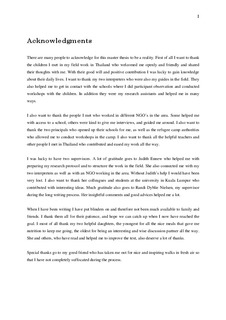'I am a Child with Education and Knowledge': Karen Migrant and Refugee Children's Daily life Experiences in Thailand
Master thesis
Permanent lenke
http://hdl.handle.net/11250/269061Utgivelsesdato
2012Metadata
Vis full innførselSamlinger
Sammendrag
This master thesis is based on a field work conducted in Thailand with migrant and refugee children from Burma belonging to the ethnic minority of the Karen people. One urban school for migrant children and one rural refugee camp school served as research sites. The study explores the daily life experiences of children aged 8 – 13, with main focus on their school life. Various methods such as observation, essay writing, drawing and photography were used in order to search for the children’s own perspectives on their life worlds. Through these methods, the children were able to express their ideas about their present and future lives.
Within ‘the social studies of childhood’, children are viewed as social agents and competent human beings. The thesis highlights the meaning of school from the children’s perspectives, as well as issues of social relationship, place identity and national identity. The study found that the children’s everyday lives consisted of school, work and play. The migrant children and the refugee children lived different lives, and consequently perceived their lives differently. School was meaningful for both the migrant children and the refugee children in the present. The children living in the refugee camp also emphasized that education was important for the future. The thesis therefore argues that if we are to acknowledge children’s perspectives of themselves and their life worlds, both present time and the future is of importance. Children are both human beings and adult becomings.
The research also found that the refugee camp children appeared to be more engaged with ideas about the ‘Karen nation’. However, their understanding of the Karen nation seemed to be more connected to local place than to their ‘homeland’, Karen state in Burma. Furthermore, the refugee children showed a great commitment to their ‘Karen people’, meaning the refugees in the camp. The meaning of school was also connected to the responsibility they felt towards the other camp residents: They wanted education to be able to help ‘their people’ and to ‘give back’.
